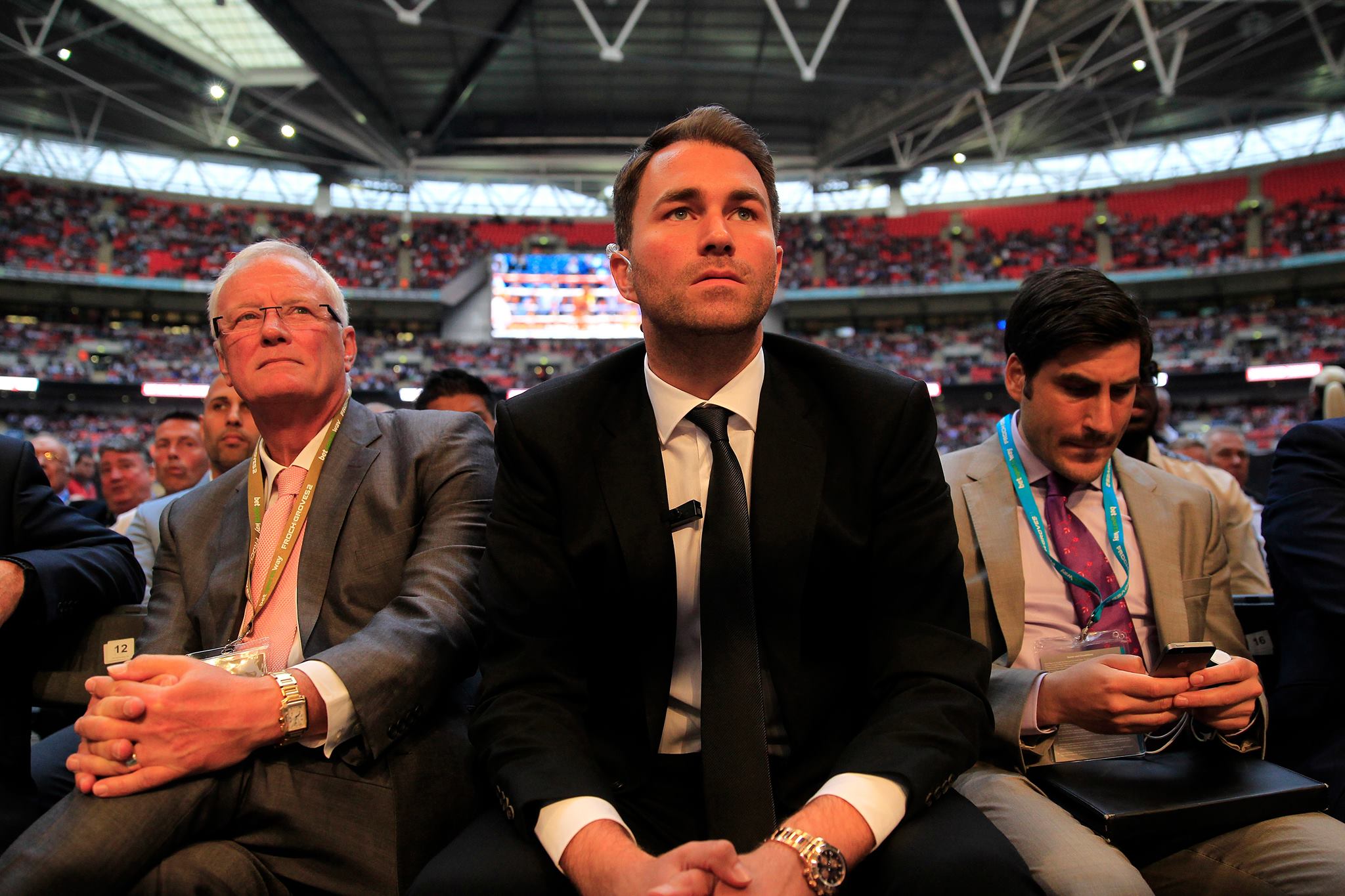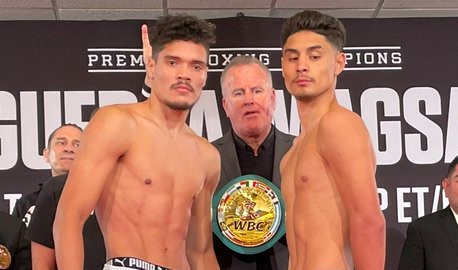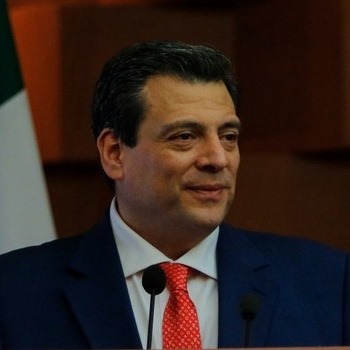by Charles Jay
As I have said before, and I’ll say again, I think that referee Joseph Cooper was probably inept enough to benefit both sides in the Amir Khan-Lamont Peterson fight. At the same time, I realize why the Khan camp must be upset, because even if Cooper’s appearance did not constitute a conflict of interest, it did give off, at the very least, the appearance of a conflict. And it is an issue important enough to address, maybe not for the reason Khan thinks it is, but in the respect that it flies in the face of some of rules under which the fight should have been conducted.
We have had a number of occasions like this through the years, most of which have not gotten a lot of attention. A notable exception was in 2002, when Kirk Johnson was disqualified in a WBA heavyweight title fight against John Ruiz in Las Vegas. The managers and promoter of Johnson were hung up on the idea that the referee, Joe Cortez, was out of line in penalizing Johnson on a couple of occasions and then in eventually giving him the DQ. That’s what they wanted to protest with the WBA. I knew that was not likely to fly, because it involved a referee’s discretion and judgment, just as it did in the Khan-Peterson fight.
But I found something elsewhere.
Ruiz was not only an American, while Johnson was a Canadian, but Ruiz was living in Las Vegas at the time, and that is where all the officials came from. I discovered that this was completely outside the rules that were allowed for by the WBA at the time.
In Section 16, Paragraph 2 of the WBA’s “World Championship Regulations and Rules” is states that:
“The officials appointed by the President to act in any Championship fight shall be NEUTRAL, this being understood to mean that they shall not be of the same nationality, residence or origin of the champion or of the challenger.”
They are by no means alone. The WBC Championship Rules work in a similar way to the WBA:
“Appointment of officials will be in accordance with the following:
a) In the case of either a mandatory or voluntary title defense, all officials, consisting of three judges and a non-scoring referee, shall be from neutral cities, states and nations. Champion and challenger born in the same nation, or of the same citizenship or residence, may have ring officials of the same nation in a championship bout, which will be considered neutral. If local commissions enforce local ring officials by law or policies, the WBC will see that the same number of ring officials of both boxer’s nation are appointed, unless special circumstances exist.”
That’s not what the Association of Boxing Commissions (ABC) wants to hear. In fact, prior to that and continuing through the present day, they have strongly encouraged local jurisdictions to have their own local officials to work championship fights, regardless of where the contestants are from. In Nevada, they were certainly not going to give up ground. And they didn’t.
I brought this to the attention of Johnson’s promoters, and a protest was filed and heard at the WBA Convention that year (to no avail, I might add), which, ironically, was held in Washington, DC.
As I mentioned, my objective was not necessarily to be an advocate of Johnson’s camp, nor to protest the call of referee Joe Cortez to disqualify Johnson. I was writing “Operation Cleanup” at the time, so I found this to be consistent with a larger purpose – to call into question the problems with sanctioning bodies being able to enforce their championship rules, over an issue that seemed to be perfectly reasonable. After all, who would want to argue AGAINST neutrality?
Well, apparently the ABC would. In fact, they have persisted in misinforming their member commissions that not only should they be autocratic about the process of selecting officials for title bouts, they are mandated by federal law to do so. At least that was what I believe to be the interpretation of Greg Sirb, former ABC president (now a Vice-President) who in the past has failed to follow rules and laws, not just on a federal level, but in his own state (Pennsylvania).
After Johnson’s protest was filed, Sirb wrote a letter to the ABC membership, which read, in part:
“The Nevada commission, as would any commission, was well within their right to select officials for this and any other match. The problem is that we as commissions are going to continue to have this sort of problem if the WBA and any other organization has in their by-laws/regulations that they indeed must approve officials or that officials must be ‘neutral’. The bottom line is that each commission has the backing of federal law to have the final say on the selection of officials. I think each organization should start to take the time to read the federal law and seriously revisit any wording that suggests that they (the organizations) control the authority over the selection of officials because if they don’t, then there are going to be many more appeals like the Johnson case. Particularly, if the WBA rules in favor of Johnson.
It is very possible that each time boxer losses (sic) his management team can file an appeal based on the fact that the organization did not follow their (selection of officials) procedures, which as I pointed out is in direct conflict with the federal law!”
Well, I would meet that not with an emphatic “NO” but a rather solid “not exactly.”
What struck me almost immediately about the letter was that Sirb was much less concerned with the image of boxing, fair decisions, or the appearance of conflicts of interest than he was about winning a pissing contest with the WBC. WBA, IBF, et al and establishing that HE was boss.
By the way, the “federal law” Sirb was referring to comes from Section 16 of the Muhammad Ali Boxing Reform Act, as is contained under the title “JUDGES AND REFEREES,” which reads:
“No person may arrange, promote, organize, produce, or fight in a professional boxing match unless all referees and judges participating in the match have been certified and approved by the boxing commission responsible for regulating the match in the State where the match is held.”
Since law involves careful use of words, I guess it’s worth delving into it.
CERTIFIED and APPROVED, in this case, does not mean SELECTED or APPOINTED. As the Ali Act is written, it almost certainly contemplates that there is one entity who would be submitting the officials for approval, while another (the commission) would actually be the entity that APPROVED them.
Otherwise, the law would have specifically stated that the boxing commission is solely responsible for SELECTING the officials. And it stands to reason that, if the state commissions were to be selecting the officials unilaterally, the term “certified and approved” would not even be included in the language, since it would no doubt be redundant. After all, one must pre-suppose that if an entity was SELECTING the officials, it would be implicit that the entity would have already APPROVED them, wouldn’t it?
I don’t think the spirit of the law was to promote such a steadfast, unilateral decision. And this was reflected in bills that were subsequently pushed by politicians (with influence from Sirb and others) but not passed. The Professional Boxing Amendments Act of 2002, for example, took into consideration the involvement and some degree of participation on the part of the sanctioning organizations. This was Section 115 (c) of the bill:
“(C) SANCTIONING ORGANIZATION TO PROVIDE LIST – A sanctioning organization —
(1) shall provide a list of judges and referees deemed qualified by that organization to a boxing commission; but
(2) may not influence, or attempt to influence, a boxing commission’s selection of a judge or referee for a professional boxing match except by providing such a list.”
If passed, this would have advanced the ABC’s objectives, but it still invited input from the sanctioning bodies, while giving the final authority to the local commission. I guess each of you can interpret that differently.
Anyway, this did not pass, but the ABC has largely proceeded as if the law was not only in place, but that any reference to a “list” was non-existent.
You know, it’s not as if a sanctioning body would be picking some clown off the street to put on such a list. Each of the officials they would be likely to submit would be someone duly licensed in their own state or country, and more often than not they have a lot of experience with championship fights.
The question might be whether they have paid money to the ABC and its president, Tim Lueckenhoff, for so-called “officials’ training” (another boxing scam – big surprise).
Forget about the semantics for a moment. What about looking at things from a practical perspective? If we put twenty reasonable, knowledgeable people into a room together, and hit them with the question, I think they would, by solid majority, come to the conclusion that having competent, neutral officials in a championship fight is, on balance, better than having a potential crew of hometown officials. Let’s put it this way – if the “neutral” officials Greg Sirb disdained had been in place for the Khan-Peterson fight, there might be some discussions over a referee’s competence, but we wouldn’t likely be hearing the term “home cooking” used as motivation for his missteps.
So really what it comes down to is a battle of “turf” the ABC is waging, in an attempt to screw the sanctioning bodies whenever and wherever they can.
And I’ve got some news for you, acquired through vast experience – the ABC offers VERY LITTLE improvement over the sanctioning bodies. In fact, in many cases it’s just the opposite.
Don’t get me started on THAT one.



















LarryFex
06/25/2024 at 1:41 am
pin up apk yukle: pin up az – pin up azerbaycan
AlbertImipt
06/25/2024 at 3:45 am
pin up azerbaycan https://azerbaijancuisine.com/# pin-up online casino
pin up apk yukle
Williamfrumn
06/26/2024 at 9:29 am
medication from mexico pharmacy: northern doctors pharmacy – mexican rx online
Williamfrumn
06/26/2024 at 12:22 pm
mexican border pharmacies shipping to usa: mexican pharmacy northern doctors – medicine in mexico pharmacies
Williamfrumn
06/26/2024 at 8:38 pm
mexico drug stores pharmacies: mexican pharmacy online – mexican pharmaceuticals online
Williamfrumn
06/27/2024 at 2:18 am
medicine in mexico pharmacies: mexican northern doctors – buying prescription drugs in mexico
Williamfrumn
06/27/2024 at 5:59 am
mexican online pharmacies prescription drugs: mexican northern doctors – mexico drug stores pharmacies
Williamfrumn
06/27/2024 at 9:45 am
purple pharmacy mexico price list: mexican northern doctors – mexican mail order pharmacies
Williamfrumn
06/27/2024 at 4:59 pm
mexico drug stores pharmacies: mexican northern doctors – mexican pharmaceuticals online
JeffreyMok
06/28/2024 at 3:47 am
http://northern-doctors.org/# mexico pharmacies prescription drugs
JeffreyMok
06/28/2024 at 6:23 am
https://northern-doctors.org/# п»їbest mexican online pharmacies
Richardled
06/28/2024 at 7:22 am
best online pharmacies in mexico [url=https://northern-doctors.org/#]mexican northern doctors[/url] mexican rx online
Williamfrumn
06/28/2024 at 7:44 am
mexico pharmacies prescription drugs: mexican pharmacy – buying prescription drugs in mexico
Williamfrumn
06/28/2024 at 9:23 am
mexican border pharmacies shipping to usa: mexican pharmacy northern doctors – mexican online pharmacies prescription drugs
Williamfrumn
06/28/2024 at 7:29 pm
reputable mexican pharmacies online: mexican pharmacy northern doctors – medicine in mexico pharmacies
Williamfrumn
06/29/2024 at 12:24 am
mexican pharmacy: mexican pharmacy online – mexico drug stores pharmacies
JeffreyMok
06/29/2024 at 1:05 am
https://northern-doctors.org/# mexican pharmacy
Ronnienop
06/29/2024 at 7:39 am
mexico pharmacies prescription drugs [url=https://cmqpharma.online/#]cmq pharma[/url] mexico pharmacies prescription drugs
Ronnienop
06/29/2024 at 4:07 pm
reputable mexican pharmacies online [url=https://cmqpharma.online/#]mexico pharmacy[/url] mexican drugstore online
DonaldBiono
06/29/2024 at 6:07 pm
mexican mail order pharmacies
https://cmqpharma.online/# mexican online pharmacies prescription drugs
mexican rx online
Ronnienop
06/29/2024 at 7:15 pm
pharmacies in mexico that ship to usa [url=https://cmqpharma.com/#]mexico pharmacy[/url] medication from mexico pharmacy
Jeffreyber
07/02/2024 at 3:31 am
https://cmqpharma.com/# mexican rx online
medication from mexico pharmacy
CharlesRor
07/20/2024 at 2:11 am
mexico pharmacy [url=https://foruspharma.com/#]mexican pharmacy[/url] buying prescription drugs in mexico online
EdwardLoobe
07/20/2024 at 4:11 am
https://foruspharma.com/# medicine in mexico pharmacies
CharlesRor
07/20/2024 at 10:57 am
mexico pharmacy [url=http://foruspharma.com/#]mexico pharmacy[/url] mexico drug stores pharmacies
EdwardLoobe
07/20/2024 at 5:17 pm
https://indiapharmast.com/# indian pharmacy paypal
CharlesRor
07/20/2024 at 8:49 pm
reputable indian online pharmacy [url=https://indiapharmast.com/#]reputable indian online pharmacy[/url] indian pharmacy
Davidtoows
07/21/2024 at 2:45 am
Online medicine order: india pharmacy – indian pharmacy
EdwardLoobe
07/21/2024 at 6:17 am
http://foruspharma.com/# mexican border pharmacies shipping to usa
Jamesjam
07/21/2024 at 8:26 pm
paxlovid price: paxlovid pill – paxlovid for sale
Jamesjam
07/22/2024 at 9:07 am
Paxlovid over the counter: Paxlovid buy online – paxlovid pill
Myronnepay
07/22/2024 at 1:11 pm
https://paxloviddelivery.pro/# paxlovid cost without insurance
where can i buy cheap clomid without a prescription [url=https://clomiddelivery.pro/#]where buy clomid online[/url] how to get clomid without rx
Jamesjam
07/22/2024 at 9:42 pm
buy amoxicillin: amoxicillin medicine – amoxicillin 500mg capsules
Jamesjam
07/23/2024 at 10:24 am
where to get amoxicillin over the counter: buy amoxicillin 500mg canada – buy amoxicillin over the counter uk
Thomaskef
07/23/2024 at 10:43 pm
http://amoxildelivery.pro/# ampicillin amoxicillin
Jamesjam
07/23/2024 at 11:07 pm
price for amoxicillin 875 mg: order amoxicillin online – ampicillin amoxicillin
Jamesjam
07/24/2024 at 11:53 am
cipro for sale: ciprofloxacin over the counter – cipro
Jamesjam
07/25/2024 at 12:25 am
doxycycline online canada: doxycycline india price – buy doxycycline online no prescription